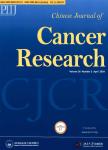Clinical significance of MET gene amplification in metastatic or locally advanced gastric cancer treated with first-line fluoropyrimidine and platinum combination chemotherapy
Clinical significance of MET gene amplification in metastatic or locally advanced gastric cancer treated with first-line fluoropyrimidine and platinum combination chemotherapy作者机构:Departments of OncologyAsan Medical CenterUniversity of Ulsan College of MedicineSeoul 05505Republic of Korea Department of PathologyAsan Medical CenterUniversity of Ulsan College of MedicineSeoul 05505Republic of Korea Asan Institute for Life ScienceAsan Medical CenterUniversity of Ulsan College of MedicineSeoul 05505Republic of Korea
出 版 物:《Chinese Journal of Cancer Research》 (中国癌症研究(英文版))
年 卷 期:2019年第31卷第4期
页 面:620-631页
核心收录:
学科分类:1002[医学-临床医学] 100214[医学-肿瘤学] 10[医学]
基 金:supported by a grant from the Korean Health Technology R&D Project Ministry of Health & Welfare Republic of Korea (No. HI12C1785)
主 题:MET amplification advanced gastric cancer prognosis quantitative real-time polymerase chain reaction
摘 要:Objective: To investigate the clinical significance of MET gene amplification in patients with gastric cancer in the palliative ***: MET amplification was assessed using fluorescence in situ hybridization(FISH) in 50 patients and quantitative polymerase chain reaction(qPCR) in 326 patients;259 patients treated with first-line fluoropyrimidine and platinum were included for survival ***: The results of FISH and qPCR indicated that the c-MET/CEP7 ratio was correlated with gene copy number. The optimal cutoff value for the copy number using qPCR to detect MET gene amplification with FISH was 5(κ=0.778, P5 detected by qPCR. MET-amplified gastric cancer was associated with an Eastern Cooperative Oncology Group(ECOG) performance status(PS) score of ≥2(33.3% vs. 10.5% P=0.007), peritoneal metastasis(76.2% vs. 46.2%, P=0.008), and elevated bilirubin levels(28.6% vs. 7.3%, P=0.006). The median overall survival(OS) and progression-free survival(PFS) were 11.9 and 5.6 months, respectively. MET-amplified gastric cancer was not associated with survival outcomes [hazard ratio(HR)=0.68, 95% confidence interval(95% CI): 0.35-1.32,P=0.254 for PFS;HR=0.68, 95% CI: 0.35-1.32, P=0.251 for OS].Conclusions: qPCR can be used to detect MET gene amplification. MET amplification was not a predictor of poor prognosis in patients with metastatic or unresectable gastric cancer.



